 Darkside (Planetside, #4) by Michael Mammay
Darkside (Planetside, #4) by Michael Mammay Format: eARC
Source: supplied by publisher via Edelweiss
Formats available: paperback, ebook, audiobook
Genres: military science fiction, science fiction, space opera
Series: Planetside #4
Pages: 336
Published by Harper Voyager on September 24, 2024
Purchasing Info: Author's Website, Publisher's Website, Amazon, Barnes & Noble, Kobo, Bookshop.org, Better World Books
Goodreads
In this thrilling, action-packed fourth installment in the Planetside series from acclaimed science fiction author Michael Mammay, retired Colonel Carl Butler gears up for another military investigation, full of danger, corporate intrigue, and tech people would kill for—perfect for fans of John Scalzi and Craig Alanson.
Colonel Butler has paid his dues and just wants to enjoy his retirement on a remote planet. But the galaxy has had other plans. He has been roped into searching for a politician’s missing son and an industry magnate’s missing daughter. He has been kidnapped, violated numerous laws, and caused the destruction of colonial facilities. He’s famous—or infamous, depending on who you ask—praised and reviled in equal measure across the galaxy for his exploits.
And he is determined to never let the government drag him into another investigation.
But when a runaway twelve-year-old girl whose father has gone missing asks him for help, well…it’s a lot harder to say no.
The girl’s father, Jorge Ramiro, was supposed to have been on Taug, a moon orbiting the gas giant Ridia 5, working on a dig with a famous archaeologist. But now there’s no sign of him and no record of him being there. Mining operations on the moon are run by two different consortiums, Caliber and Omicron—both of which have tried to kill Butler in the past. Butler doesn’t believe in coincidence.
Landing on Taug with his right-hand man Mac, computer genius Ganos, and an elite security squad, Butler soon finds that they’ve charged back into the crosshairs—because Ramiro is not the only who has disappeared, and the perpetual darkside of this moon is hiding more than the truth about a missing archeologist…
My Review:
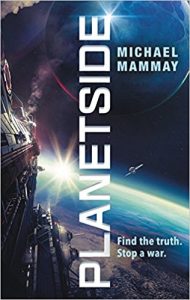 Carl Butler has the worst best luck in universe. Or the other way around. He always gets his team out of whatever FUBAR situation he’s gotten them into. Then again, it’s a FUBAR situation that they’re in because FUBAR follows him around like a lost puppy that doesn’t seem to realize it’s already found a forever home.
Carl Butler has the worst best luck in universe. Or the other way around. He always gets his team out of whatever FUBAR situation he’s gotten them into. Then again, it’s a FUBAR situation that they’re in because FUBAR follows him around like a lost puppy that doesn’t seem to realize it’s already found a forever home.
Or, to put it the way that Butler’s ace hacker Ganos put it, “This is a Carl Butler operation. When is it not the worst-case scenario?”
Carl and company put themselves into this particular mess because an almost literal lost puppy – or at least a young girl with puppy dog eyes – has shown up on his rather remote doorstep.
He’s retired and he’s enjoying it. Dammit. At least that’s what Butler says, anyway.
But he can’t resist Eliza Ramiro and her crowdfunded campaign to hire him to find out what happened to her missing father. Based on her story, he’s pretty sure it’s going to be bad news. At 12, she’s old enough to know that as well.
Still, she needs to KNOW and not just assume. And he gets that. And he’s probably a bit bored – even if he’s trying to tell himself that he’s not.
His team knows he’s going as soon as Eliza tells her story. It just takes Carl a while to catch up. Which is fine because they are way ahead of him on planning this trip he says he doesn’t want to take – when they all know that he really does.
The problem that Butler discovers when he reaches the last place Jorge Ramiro was seen is that everyone on Taug is way, way ahead of him as well. Including not one but two interstellar mining corporations who have each done their damndest to kill Butler in the past – and are unlikely to have compunctions about doing so in the present.
Especially on a remote little moon where each corporation is sure that they control all the shots on the surface and all the lawyers and spin doctors they could possibly need to make sure that what happens on the darkside stays buried there forever.
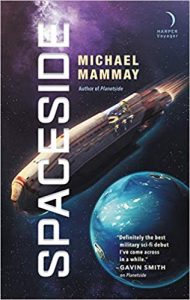 Escape Rating A: I got caught up in Carl Butler’s (mis)adventures back in the first book in this series, Planetside, and I’ve been just as captivated by each of the subsequent “clusterf–ks” the man has somehow managed to get himself into, Spaceside and Colonyside. And now here we are on Darkside, literally the darkside of a moon. And it looks like Butler is going to leave this moon as the scapegoat for everything that happens – even the stuff that happened before he arrived – again.
Escape Rating A: I got caught up in Carl Butler’s (mis)adventures back in the first book in this series, Planetside, and I’ve been just as captivated by each of the subsequent “clusterf–ks” the man has somehow managed to get himself into, Spaceside and Colonyside. And now here we are on Darkside, literally the darkside of a moon. And it looks like Butler is going to leave this moon as the scapegoat for everything that happens – even the stuff that happened before he arrived – again.
Which seems to be his role in the universe. I wouldn’t say he’s exactly “OK” with that role, but he’s willing to accept it as long as the job gets done and he and his people get out more or less in the same number of pieces they started in. He’s honestly less invested in whether he, himself, gets out intact – but his team is VERY invested in THAT, in spite of himself.
What makes this book, and this whole series, work, is that it rides or dies – and does it ever ride – on the universe-weary voice of its protagonist, Colonel Carl Butler (ret.) Butler had and still has a reputation for getting the job done. At the same time, he had more than enough rank in the military to have gotten a good picture of how the universe’s sausage gets made. He’s pragmatic about pretty much everything except the fate of his team, and will bend ALL the rules to the point of breakage to take care of business.
He’s experienced enough and smart enough – when he lets himself take the time to BE smart – to understand how the levers of power get pulled – and to make sure that a realistic number of them get pulled in his favor whenever possible.
Above all, he’s loyal to his team – and they’re loyal to him. And that loyalty inspires others to be loyal as well. One of the things that he does very well, that shines as part of his personality, is the way that he does his best to bring out the best in everyone he works with.
 He’s a good man who does some very bad things – but tries to mitigate the damage whenever he realistically can. Which doesn’t mean he isn’t perfectly willing to ream EVERYNONE involved in this CLUSTERF*** a new one. Then again, they deserve it. And we’re right there with him hoping that they all get exactly what they deserve.
He’s a good man who does some very bad things – but tries to mitigate the damage whenever he realistically can. Which doesn’t mean he isn’t perfectly willing to ream EVERYNONE involved in this CLUSTERF*** a new one. Then again, they deserve it. And we’re right there with him hoping that they all get exactly what they deserve.
At the top, I said that Carl Butler has the worst best luck in the universe. He’s actually not alone in that distinction. I was listening to Ghostdrift, coincidentally also the fourth book but in the Finder Chronicles, as I read Darkside, and Fergus Ferguson has pretty much the same kind of luck that Butler does. He’s a walking avatar for Murphy’s Law, he gets into the worst situations at the drop of a hat, everyone’s plans go straight to hell in his vicinity, but he somehow manages to survive and bring his team out intact. The two stories are both told in the first-person, and both characters have similar universe-weary voices which they each came by honestly although from different directions. Meaning that if you like one you’ll like the other. I certainly do.
Which means that I was thrilled to read in the author’s blog that he’s working on book 5 in this series and has started planning book 6. Wherever those stories take Butler and his team, I’ll be along for the ride.

 Earthlight by
Earthlight by  I NEED a text so I can hunt for quotes AND have a full list of characters, how their names are spelled and who played them in the audio. Because the cast was outstanding – every single one.
I NEED a text so I can hunt for quotes AND have a full list of characters, how their names are spelled and who played them in the audio. Because the cast was outstanding – every single one. The Runes of Engagement by
The Runes of Engagement by 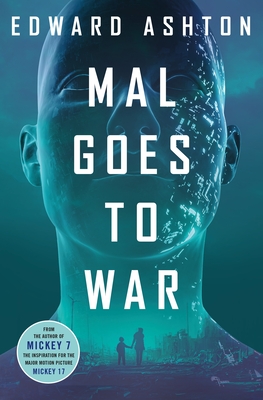 Mal Goes to War by
Mal Goes to War by 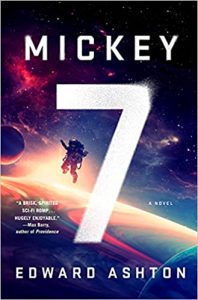 Because Mal isn’t human at all. He’s a free A.I., or as his people prefer to be called, a Silico-American. He’s merely observing this stupid war from the perspective of an otherwise fairly autonomous but not intelligent drone when he gets the wild and crazy idea to see what it would be like to have a body.
Because Mal isn’t human at all. He’s a free A.I., or as his people prefer to be called, a Silico-American. He’s merely observing this stupid war from the perspective of an otherwise fairly autonomous but not intelligent drone when he gets the wild and crazy idea to see what it would be like to have a body. What hooks the reader, or at least this reader, from the very first page is Mal’s conversation with his two fellow A.I.s, Clippy and !HelpDesk. They’re all snarky to the max, and none of them think much of humanity. To them, we’re entertainment – and we’re bad, boring entertainment at that.
What hooks the reader, or at least this reader, from the very first page is Mal’s conversation with his two fellow A.I.s, Clippy and !HelpDesk. They’re all snarky to the max, and none of them think much of humanity. To them, we’re entertainment – and we’re bad, boring entertainment at that.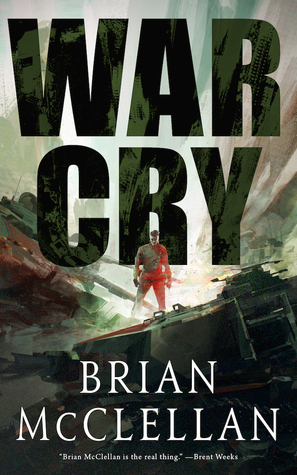 War Cry by
War Cry by 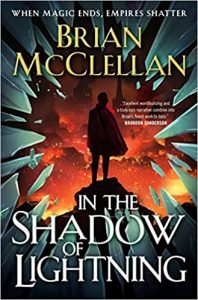 I picked this up because I adored the author’s
I picked this up because I adored the author’s  This turns out to be a story that embodies, not just Sherman’s “War is Hell” quote, but more especially a less often seen quote from G.K. Chesterton that goes, “The true soldier fights not because he hates what is in front of him, but because he loves what is behind him.” Or in the case of Teado and his company, because he loves what is beside him.
This turns out to be a story that embodies, not just Sherman’s “War is Hell” quote, but more especially a less often seen quote from G.K. Chesterton that goes, “The true soldier fights not because he hates what is in front of him, but because he loves what is behind him.” Or in the case of Teado and his company, because he loves what is beside him.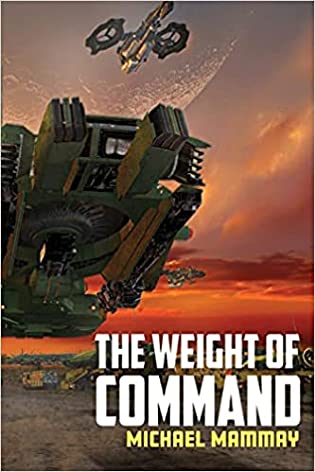 The Weight of Command by
The Weight of Command by 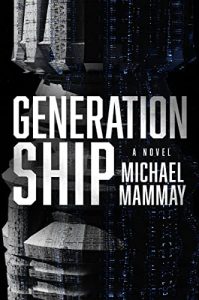 I picked up The Weight of Command because I adored the author’s previous work, especially his
I picked up The Weight of Command because I adored the author’s previous work, especially his 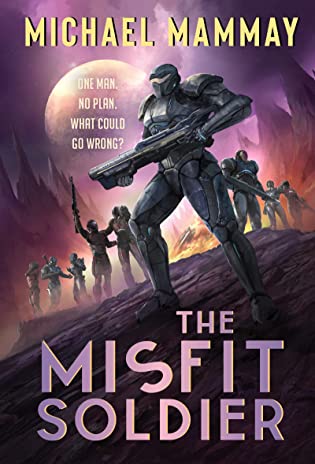 The Misfit Soldier by
The Misfit Soldier by  Colonyside (Planetside, #3) by
Colonyside (Planetside, #3) by 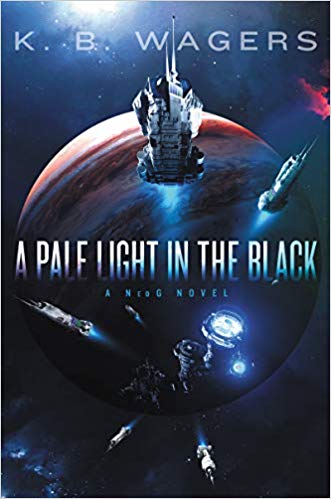 A Pale Light in the Black (NeoG #1) by
A Pale Light in the Black (NeoG #1) by  Junkyard Cats by
Junkyard Cats by